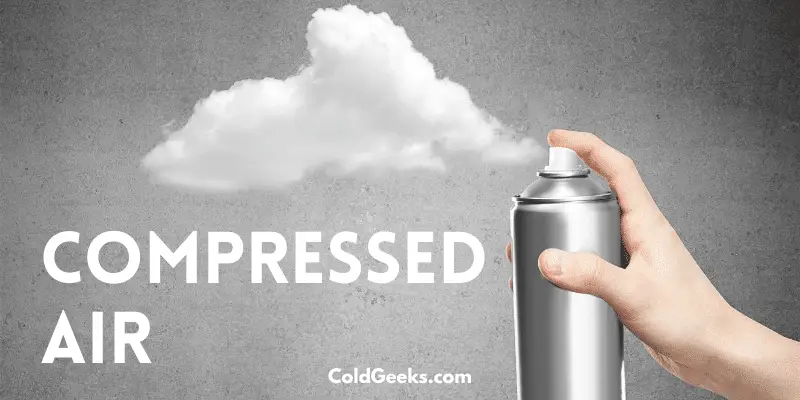If you’ve ever used compressed air or cans of compressed air, then you know that they can get very cold.
Why does compressed air get cold?
Compressed air gets cold because of rapid expansion and evaporation. When compressed air turns into gas, the molecules of air spread apart and dissipate, lowering the temperature. When you spray canned air, the change in pressure makes the can of compressed air cold.
In this article, you’ll learn everything you need to know about, “Why does compressed air get cold?”
Why Does Compressed Air Get Cold? (The Science)

I often get asked, “Why does compressed air get cold when released?”
Compressed air gets cold because of adiabatic expansion and the laws of thermodynamics.
Adiabatic Expansion
Adiabatic expansion is an irreversible process in which a gas expands without exchanging heat with its surroundings.
The word “adiabatic” comes from the Greek prefix “a,” meaning “not,” and the word “dia,” meaning “through.”
Together, these prefixes indicate that no heat is exchanged during adiabatic expansion.
Instead, the temperature of the gas changes due to the surroundings.
One example of adiabatic expansion is the way in which a balloon expands as it is filled with air.
The air inside the balloon is compressed as more air is added, and this compression causes the temperature of the air to rise.
However, since the balloon is not in contact with anything else, no heat is exchanged between the air and its surroundings.
As a result, the only thing that changes is the internal energy of the system (in this case, the air inside the balloon), and thus the temperature of the system increases.
Thermodynamics
When you compress air, you are increasing the air’s pressure.
Releasing the pressurized kinetic energy makes the molecules more spread out, and as they move apart, they cool down.
The molecules of compressed air have more energy than the molecules of regular air, so they will transfer some of their energy to anything they come into contact with.
That’s why your can of compressed air feels cold when you use it.
Compressed air also has a higher density than regular air. This means that there are more molecules in a given volume of compressed air than there are in the same volume of regular air.
The extra molecules bump into each other and transfer their energy to each other, which makes them all colder.
That’s why compressed air is often used to cool things down.
Why Does Compressed Air Get Cold Upside Down?
Compressed air gets cold upside down because of the contents of the canned air.
Also, because of physics.
Compressed air is made up of gas molecules that are packed together tightly.
Flipping the can of compressed air upside down changes the psychics. Upside down, liquid shoots out not gas.
Why? When the bottle is standing upright, a gas layer rests at the top of the can near the nozzle.
But, upside down, that gas isn’t there to prevent the liquid from spraying out.
Upside down, the gas is no longer at the “top” near the release nozzle.
As the liquid leaves the can, it expands and cools rapidly. When a gas expands, it cools (think of how your lungs feel after taking a deep breath on a cold day).
The molecules move further apart and take up more space, which requires more energy.
This energy comes from the heat in the surrounding air, which makes the compressed air molecules colder.
Why Does Compressed Air Get Cold When Released?
The release of compressed air triggers the state change from liquid to gas and lowers the pressure of the air as it expands and evaporates.
The “release” is the trigger for the temperature change and that’s why compressed air gets cold when released.
As the air expands, it cools down.
Additionally, as the pressure decreases, the air can no longer hold as much heat.
The heat escapes and this also contributes to the temperature change.
Why Do Aerosols Get Cold?
Another way to ask this question is, “Why does canned air get cold?”
Aerosols are great for dusting off electronics, but have you ever noticed that they feel cold when you use them?
It turns out that there’s a scientific reason for this.
The cans that aerosol aerosols come in actually contain a liquid. This liquid rapidly evaporates when the pressure is reduced slightly – that way, a large amount of gas can be stored in a small, low-pressure can.
When you press the nozzle on an aerosol can, this releases vapor, lowering the internal pressure and allowing the liquid to evaporate.
As the liquid evaporates, it cools down – and that’s why aerosols feel cold when you use them.
Here is a good video about why compressed air cans get cold:
Does Compressed Air Get Hot or Cold?
Compressed air gets hot.
To understand how compressed air gets hot, it’s important to first understand what happens to air when it’s compressed.
When air is compressed, the molecules are pushed closer together.
This creates friction and heat. The more air that’s compressed into a smaller space, the hotter it will become.
However, when compressed air is released, the molecules expand and cool down.
This is why decompressed air feels cooler than the surrounding air.
Does Compressed Air Get Cold Because of a Chemical Reaction?
You might have heard that compressed air gets cold because of a chemical reaction.
But is this really true? The short answer is no. Not really.
The real reason has more to do with the kinetics of gases.
Here’s a closer look at how it works.
When you compress air, you are essentially increasing the number of molecules in a given space.
This increase in density means that the molecules move around less, thus having less kinetic energy. Kinetic energy is what allows molecules to move, and as they lose this energy, they slow down.
This decrease in temperature is due to the loss of kinetic energy, not to any sort of chemical reaction.
Final Thoughts: Why Is Compressed Air Cold?
The bottom line is that compressed air gets cold because of how compression, decompression, dispersion, and dissipation work.
Thanks for reading!
Feel free to browse around this site for many other articles about cold-related topics.
Related posts:
- Are Keys Magnetic in Cold Weather? (Solved)
- Is PEX Good for Cold Weather? (Solved & Explained)
- Why Does Silver Melt Ice? (Everything You Need To Know)
- Why Do Bullets Spin on Ice? (Answered and Solved)
